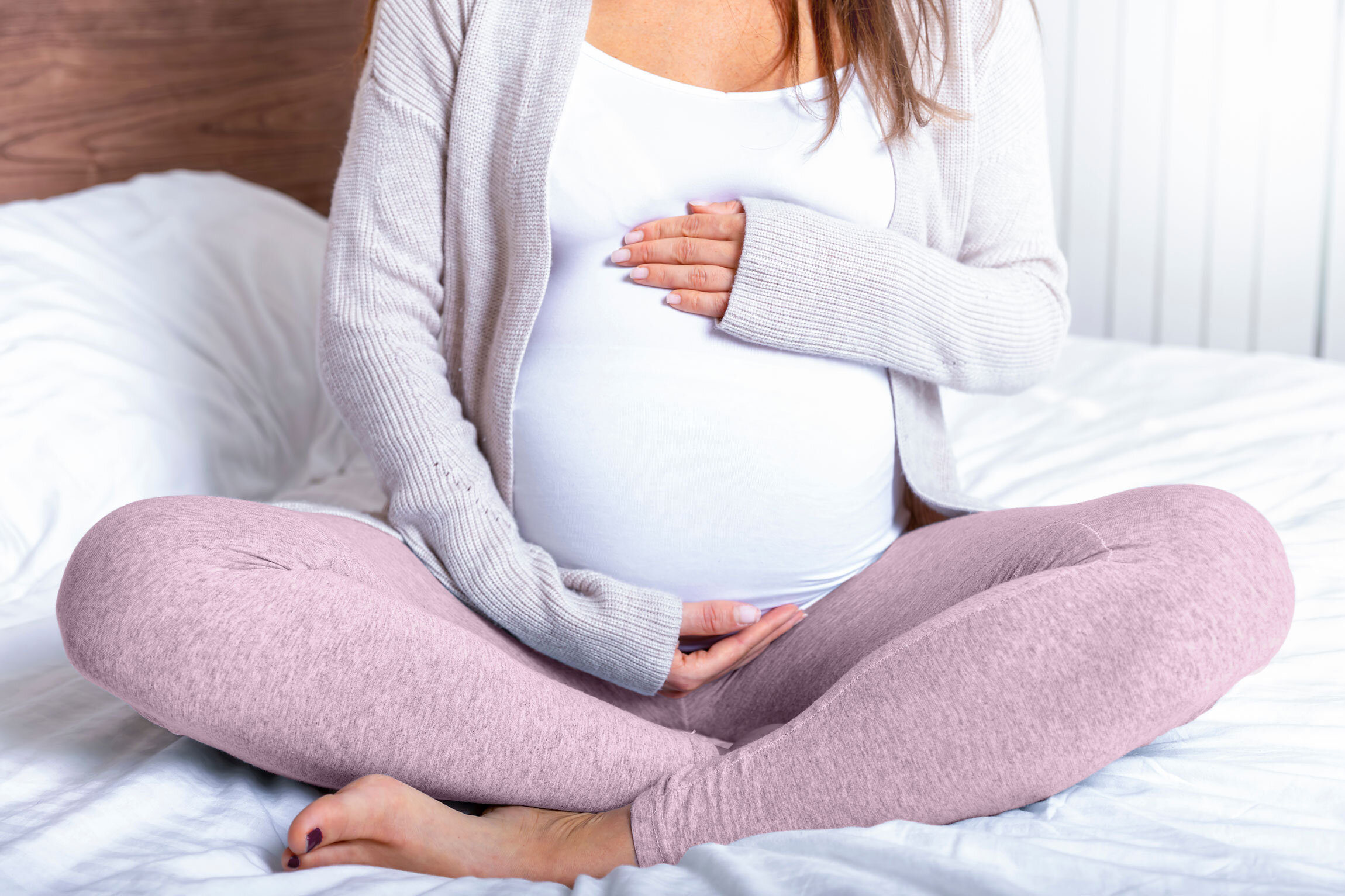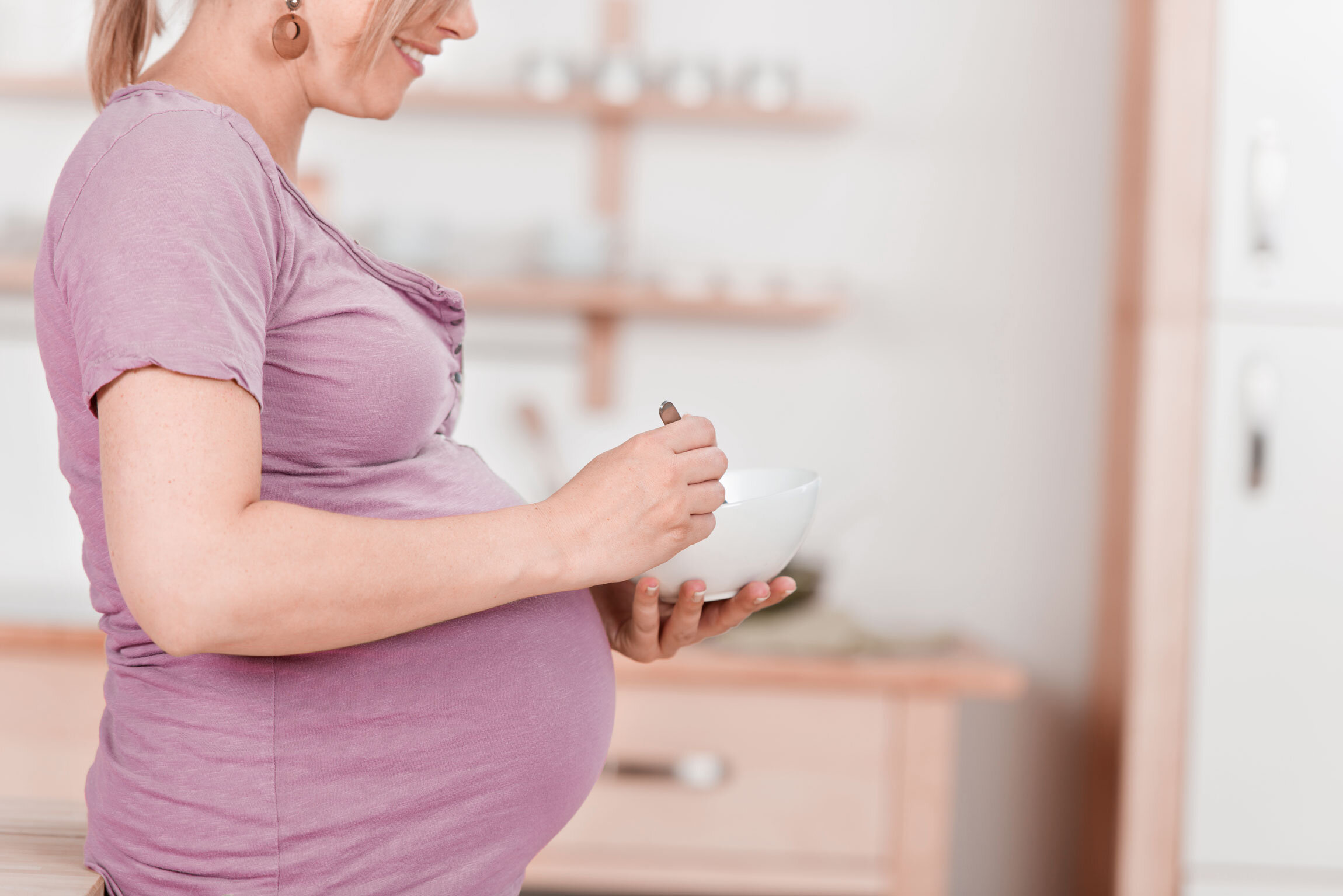During pregnancy, the need for certain micronutrients increases. For example, future mums need more iron, folic acid, vitamins and iodine, the latter playing a particularly important role for the healthy development of the baby.
Iodine is an important trace element that is not only essential for the baby’s physical development, but also for the development of the nervous system and the brain. Ensuring a sufficient maternal iodine intake is further important because iodine helps to keep the body’s metabolism healthy, among other things.
Why is iodine important during pregnancy? How much iodine in pregnancy is needed to ensure the baby’s healthy development? What are the symptoms of low iodine in pregnancy and what are the risks for mother and child?
Table of content
The importance of iodine in pregnancy
Symptoms of iodine deficiency in pregnancy
Consequences of iodine deficiency in pregnancy
The right diet for preventing iodine deficiency in pregnancy
Getting professional advice on iodine deficiency in pregnancy
Supplementing iodine during pregnancy: how much is too much?
A final word on low iodine in pregnancy
The importance of iodine in pregnancy
Before looking at the possible risks associated with iodine deficiency in pregnancy, let’s first answer another important question: Why is iodine important during pregnancy?
Iodine is a vital trace element that is involved in numerous processes in the body. It is an essential component of different thyroid hormones that control the body’s metabolism, regulate body temperature and ensure healthy cell growth. Since the body cannot produce iodine, the trace element must be obtained via food.
The female body needs more iodine during pregnancy because it not only needs to supply the mother’s thyroid gland with enough iodine, but also needs additional iodine to support the healthy development of the baby. Your baby's brain and nervous system can only develop properly with a good supply of iodine.
The British Dietetic Association (BDA) recommends that pregnant women should consume 200 micrograms of iodine per day.

Symptoms of iodine deficiency in pregnancy
Many people immediately think of a goitre, a visible enlargement of the thyroid gland, when someone mentions iodine deficiency. However, the symptoms of a low iodine status are much less specific at first.
Possible iodine deficiency symptoms in pregnancy include:
- Tiredness
- Lack of motivation
- Reduced ability to concentrate
- Sensitivity to cold
- Tightness in the throat
- Problems with breathing and swallowing
Many of these symptoms could also indicate an iron deficiency during pregnancy, which is why you should pay close attention to your diet during this time. If you have any doubts or questions, don’t hesitate to speak to your GP or midwife. Only a urine test can provide clarity on your iodine status.
Consequences of iodine deficiency in pregnancy
What happens if you don't take iodine during pregnancy? This question is often raised by mums-to-be who are concerned about their baby’s healthy development. Iodine is involved in many important processes in the body. But what are possible consequences of iodine deficiency in pregnancy?
If the mother has low iodine levels during pregnancy, this can have different implications for the baby. Possible effects on the unborn baby include:
- Impaired physical development
- Thyroid function disorders
- Stunted growth
- Impaired neurological development
- Reduced cognitive ability
According to the German Federal Institute for Risk Assessment, severe iodine deficiency in pregnancy can even lead to increased risk of miscarriage or stillbirth.
However, insufficient iodine intake during pregnancy not only affects the baby, but can also adversely affect maternal health. In addition to common symptoms like tiredness and decreased ability to concentrate, a long-term iodine deficiency can lead to hypothyroidism.
Hypothyroidism (i. e. an underactive thyroid) can have severe consequences for the mother’s overall health. This includes slow metabolism, reduced cognitive and physical performance and the formation of thyroid nodules.

The right diet for preventing iodine deficiency in pregnancy
The best way to avoid low iodine in pregnancy is to eat a healthy, balanced diet. Foods that are rich in iodine include:
- Seafood
- Milk and dairy products
- Eggs (if the animals are fed appropriately)
- Spinach
- Meat products made with iodised salt
- Sea fish, especially cod and plaice
Please note: Even though sea fish and seafood are generally good sources of iodine, mums-to-be need to be careful. Fish and seafood should always be cooked properly and not eaten raw, which is why sushi is a no-go during pregnancy. Future mothers also need to pay special attention to the type of fish they consume. Large predatory fish often contain high levels of mercury and should therefore be avoided.
It is generally recommended to use iodised table salt when cooking. Ideally, salt should also be enriched with fluoride and folic acid. Also, when eating processed foods such as bread and cheese, try to choose products that contain iodised salt.
Good to know: Women also have an increased need for iodine whilst breastfeeding. Therefore, your breastfeeding diet should also be rich in foods that contain sufficient iodine.
Getting professional advice on iodine deficiency in pregnancy
Iodine and iron deficiency have very similar symptoms and in both cases, there can be consequences for the pregnancy. Unlike iron levels, however, iodine levels usually aren’t checked during the antenatal appointments that are offered to future mums.
Nonetheless, regular health check-ups are an important means of preventing low iodine in pregnancy. During the appointments, your GP or midwife should also address aspects like nutrition and diet, which should also include the importance of iodine in pregnancy. If they don’t, you shouldn’t hesitate to bring the topic up yourself and ask them for concrete advice for your personal situation.
Supplementing iodine during pregnancy: how much is too much?
For fear of a possible iodine deficiency in pregnancy, future mothers often toy with the idea of taking dietary supplements to increase their iodine levels. However, iodine supplementation should be discussed with a GP or dietitian because too much iodine can be harmful. But how much is too much iodine in pregnancy?
There is no official guideline on how much iodine is too much because this largely depends on the person. The British Dietetic Association states on its website that adults should not exceed a daily intake of 600 micrograms.
Iodine tablets or other iodine supplements should only be taken after an individual analysis of iodine intake from food because combining foods that are rich in iodine with dietary supplements could lead to excess iodine intake. Excess iodine intake during pregnancy can lead to hyperthyroidism and other health issues and should therefore be avoided.
Good to know: Eating a normal, well-balanced diet typically won't lead to excess iodine intake. However, future mothers need to be careful when regularly consuming seaweed and food supplements made from it. This is because seaweed contains very high concentrations of iodine.
A final word on low iodine in pregnancy
- Iodine is a vital trace element that is needed to produce thyroid hormones which are needed for normal metabolic function and for maintaining physical and cognitive performance.
- Women have an increased need for iodine during pregnancy and breastfeeding.
- Iodine deficiency in pregnancy can have serious negative consequences for the physical and cognitive development of the baby.
- For the mother, low iodine in pregnancy can lead to symptoms like tiredness, fatigue, forgetfulness and sensitivity to cold.
- In order to prevent iodine deficiency, future mums should make sure to eat a healthy, balanced diet during pregnancy that includes iodine-rich foods such as dairy products, sea fish and spinach.
References
- Rundum - Schwangerschaft und Geburt - BZgA Shop
- Jod | DGE
- Jod, Selen, Vitamine und Ernährung für die Schilddrüse (deutsches-schilddruesenzentrum.de)
- Jodversorgung in Deutschland wieder rückläufig - Tipps für eine gute Jodversorgung - BfR (bund.de)
- Jod - Ausgewählte Zahlen und Fakten (bmel.de)
- Jodmangel: Das sind die Symptome (aok.de)
- Jod, Folat/Folsäure und Schwangerschaft - Ratschläge für die ärztliche Praxis (bund.de)
- Iodine (bda.uk.com)
















